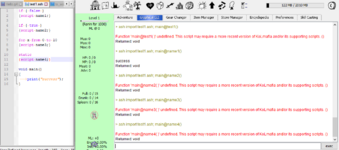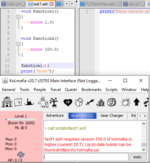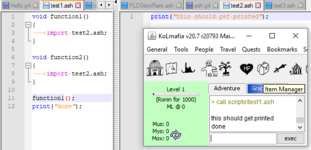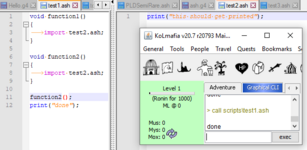In your response to gausie, you come across as dismissive of his concerns, and then you basically say "you can look at the patch to confirm that it works."
If I came across as dismissive, I would welcome help to not appear as such, but my intent wasn't to be dismissive, it was simply to
progress the discussion.
I wasn't trying to say "naaaaah, you're worrying for nothing, c'mon, commit!!", I was addressing his points as best as I understood them, and was letting him respond.
I successfully addressed a point? Great, he just won't need to mention it again.
I misunderstood something? You can point it out.
I only partially addressed something, or addressed something unrelated/unsubstantial? Then bring it up, and continue talking about the point.
Point per point:
though I can see an argument for notify
No. A script can only notify a single user, so more than one notify does nothing.
I didn't really understand what he meant by "I can see an argument for it". He didn't explain what the argument was. As far as I knew, there was no use to a second notify argument, because they were
ignored altogether, so I simply pointed it out. If I was wrong, he could have replied with something like "uh... Yes, <explanation of a way a second notify directive matters>", and I would have felt stupid for not thinking about it (if it was true).
That since behaviour is probably preferable to removing support for now - i.e. we enforce the highest since value present in the code.
There's no issue with that. The issue is how weird it would be to add a since in the middle of your code.
Your script can have an since directive, and your imported scripts can each have one, too. Whichever is highest doesn't even matter; it's enforced immediately upon seeing one/them/each/any.
Here, I wasn't dismissive, I was
literally agreeing with him.
I only noted that it would "feel weird" to see that directive in the middle of a script.
Does he agree? Does he disagree?
Should we keep allowing these anywhere? I was just... waiting to find out, to see where to go next...
In any case I would check is that your patch doesn't break one file with a since directive importing another file with a since directive, because they're sort of concatenated.
import directive don't actually concatenate the content of the imported script in the importing script; the "main" script, as well as each imported script, can all have their own directives without problems.
(Either way, you can give a quick look at the patch to see that this was, indeed, taken into consideration)
Here, I just... didn't understand what he meant??
No, as far as I know, there's no such thing as the directives being "sort of concatenated"?
I pointed out that, AFAIK, that point was false, since it was resting on a false premise (as I understood it), and that he could see for himself, because there's no other way to prove this: you can argue as much as you want, swear that something behaves one way or another, the only way to be sure is to... see it for yourself.
This is the same thing as the first point: had I missed something obvious? He could have pointed it out, and could even be entitled to lord it over me.








